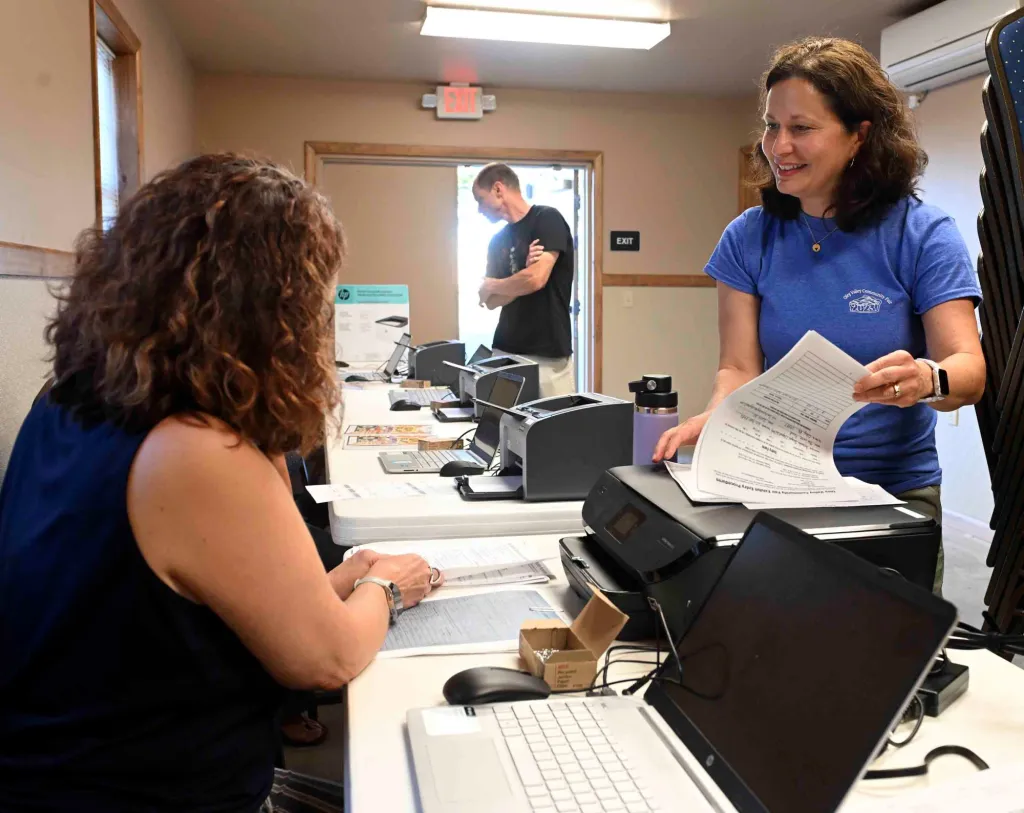US trade pact being finalised by Commerce Ministry officials despite the shutdown in Washington
By Joseph O’ Connor
Copyright thaiexaminer

New Commerce Minister Suphajee Suthumpun races to finalise the US trade pact despite Washington shutdown, determined to boost Thailand exports 6-7% in 2025 as firms leverage FTAs, tap new global markets, and recover from August’s 4.19% drop.
New Minister of Commerce Suphajee Suthumpun has confirmed her team is racing to finalise the US trade pact, even as officials in Washington DC work through the government shutdown. The dynamic minister, one of the brightest outsider stars in the interim cabinet, is determined to push Thailand’s exports up by 6-7% this year. Thai exporters are already leveraging existing free trade agreements to tap new global markets. Despite a 4.19% drop in exports in August, Ms. Suphajee is set on driving Thai products aggressively into international markets. She believes now is the moment to build momentum after a year of uncertainty and trade disruptions.
Suphajee Suthumpun, a former hotel and hospitality industry executive, has been pulled into government service by Prime Minister Anutin Charnvirakul. Although an outsider, she is already considered one of the most promising members of the interim cabinet, sworn in last week. As Minister of Commerce, Ms. Suphajee has rapidly taken charge of multiple initiatives to strengthen Thailand’s economy.
On Thursday, the Ministry of Commerce unveiled a seven-month plan aimed at boosting economic performance before the year ends. Furthermore, the plan addresses both immediate challenges and long-term stability during what is expected to be a short-lived administration. Ms. Suphajee has set a goal to expand exports by 6-7% in 2025.
This follows a year marked by uncertainty, global headwinds, and a confirmed fall in exports of 4.19% in August. Nevertheless, industry confidence remains strong, as resilient Thai firms continue to operate steadily.
New minister confirms ongoing US trade pact negotiations and plans to boost Thailand’s exports
Despite a 19% US tariff rate, the Ministry projects strong trade prospects extending into 2026. In addition, Ms. Suphajee confirmed her officials are working to finalise the US trade pact negotiated by the previous government. She told reporters that despite the US government shutdown this week, talks and exchanges between Thai and US officials continue.
Consequently, industry leaders can expect more certainty, as the deal underpins plans for a rehabilitation and reset of Thailand’s manufacturing and export sectors.
Moreover, the Ministry is keen on encouraging Thai firms to broaden their horizons. Figures released on Thursday show that businesses are actively analysing trade agreements to boost exports abroad. In particular, the Ministry seeks to conclude the US trade deal and a comprehensive European Union pact, which remain top priorities for Thailand’s trade strategy.
At an online briefing, Ms. Suphajee unveiled the “Quick Big Win” strategy, focusing on seven urgent policy areas. These measures are designed to accelerate exports, lower the cost of living, stabilise agricultural prices, and strengthen SMEs.
Quick big win strategy outlines seven urgent policy areas to boost exports and stabilise the economy
Consequently, exports are projected to grow 6-7% this year, exceeding earlier estimates of 2-3%. The Ministry expects average monthly exports of US$24 billion in the last four months of 2025, with total exports surpassing 12 trillion.
Over the next four months, several priorities will be implemented. First, the Ministry will finalise the Reciprocal Tax Agreement with the US. In addition, rules of origin will be updated, and certificates of origin will be fully digitised to increase transparency and prevent fraud. Despite a US government shutdown, trade negotiations continue uninterrupted, ensuring smooth progress.
To expand markets, the Ministry plans to leverage existing FTAs and explore new markets in Saudi Arabia, the UAE, South Africa, India, and Vietnam. Meanwhile, business matching programs will connect Thai firms with overseas partners. Furthermore, an FTA with South Korea is expected to be finalised by year-end, while discussions with the EU will continue into the first quarter of 2026.
Ministry outlines export growth plans with FTA expansion and new international markets targeted
Ms. Suphajee also stressed domestic support initiatives. Blue Flag fairs in border provinces affected by the Cambodia dispute will reduce living costs. In addition, a 100% transport subsidy through Thailand Post will help small businesses in these areas. These measures aim to provide alternative marketing channels and reduce business risks in sensitive regions.
Cost-of-living reduction is another major focus. The Ministry signed a memorandum of understanding with over 100 private hospitals to disclose medicine prices before payment. Consequently, citizens can purchase medicines at lower prices outside hospitals.
This initiative is expected to save ฿32.4 billion annually. Furthermore, Blue Flag fairs organised nationwide help consumers save over ฿5 billion each year.
The Ministry is also stabilising agricultural prices, particularly rice. Low-interest loans will allow farmers to delay sales and prevent market gluts. In addition, subsidies of ฿1,000 per rai are being provided to 4.6 million households. Meanwhile, trade agreements with China, Japan, and Singapore are being pursued to maintain export stability. As a result, paddy rice prices are expected to reach ฿7,000 per ton within 2-3 months.
Domestic initiatives target living costs and agricultural stability through fairs and subsidies
To increase competitiveness, the Ministry is promoting Thai products internationally. Support includes expanding access to new markets, providing loans, and encouraging certification under Thailand Trust Mark and Thai SELECT.
Additionally, artificial intelligence is being used to analyse supply and demand trends. Consequently, timely trade measures can be implemented. E-commerce platforms are also being expanded to connect Thai producers with global consumers.
Ms. Suphajee’s seven Quick Big Win policies provide a clear roadmap for action. The first policy focuses on the US trade agreement, digitising rules of origin and certificates of origin. Previously, hundreds of fraudulent certificates were recorded each year. Now, only five were reported in 2024, and none in 2025. In addition, the anti-dumping process, which once took 12-18 months, is now reduced to nine months using AI-based verification.
The second policy addresses Thai-Cambodian border trade. Blue Flag fairs in seven provinces, combined with free parcel shipping, aim to reduce living costs and support small businesses. Third, FTAs and market expansion are being accelerated.
Quick big win policies aim to improve trade transparency and support exports with border initiatives
Negotiations with South Korea and the EU continue, while new markets in the Middle East, South Asia, Africa, and ASEAN are being explored. Consequently, export growth is expected to reach 6-7%, worth around ฿12 trillion.
The fourth policy targets cost-of-living relief. Around 1,300 Blue Flag fairs annually offer discounts during festivals and school terms. Collaborations with private hospitals to disclose medicine prices will save ฿32.4 billion annually.
Fifth, agricultural stability is being reinforced through low-interest loans, cooperative stockpiles, and subsidies. G2G rice exports to China are being accelerated to 500,000 tons. Negotiations with Japan and Singapore maintain rice quotas.
The sixth policy strengthens SMEs and enhances product value. Loans and quality certifications are promoted while supporting access to new markets in Africa, South Asia, and Latin America. The seventh policy focuses on regulatory reform and technology use. AI is being applied to facilitate trade and remove obstacles, ensuring faster business operations.
Ministry’s seven policies combine trade growth living cost relief and agricultural support for competitiveness
“The Ministry of Commerce is 105 years old and will continue to serve Thailand,” Ms. Suphajee said. “Our work is not just a quick win but a sustainable foundation for our country and people.”
Data from the Ministry shows that during the first seven months of 2025, FTA utilisation and exports grew 11.57%, reaching US$53.421 billion. This represents 81.59% of FTA privileges, demonstrating the critical role of trade agreements. The top destinations for exports under FTAs were ASEAN at US$18.51 billion, ASEAN-China at US$16.05 billion, ASEAN-India at US$6.23 billion, JTEPA at US$3.67 billion, and TAFTA at US$3.20 billion.
The most exported products under FTA benefits included durian, vehicles for transporting goods, synthetic rubber, unwrought platinum, and sugar. High-usage agricultural products included durian, sugar, processed chicken, fresh fruit, and shredded cassava, totalling US$15.71 billion, or 29.41% of the total FTA export value. Meanwhile, industrial exports, including vehicles, synthetic rubber, platinum, air conditioners, and automatic machinery totalled US$37.71 billion, or 70.59% of FTA export value.
Department of Foreign Trade monitors FTA utilisation and highlights main products driving Thai exports
The Department of Foreign Trade monitors rights utilisation under 12 of Thailand’s 14 FTAs. Exceptions include the Thailand-New Zealand Closer Economic Partnership and the ASEAN-Hong Kong Free Trade Agreement. In a volatile global trade environment, utilising FTA benefits reduces barriers, creates tax advantages, mitigates economic uncertainty, and opens new markets.
Durian, cassava, rubber, and fresh fruits remain the main drivers of agricultural exports, particularly to China. India’s market shows high potential due to purchasing power and growing consumption. Meanwhile, exports of platinum, gems, and jewellery grew strongly in July 2025, reflecting the diversity of Thai products.
Concern for US tariff deal as new Thai government shows enthusiasm for stronger links with Beijing
New cabinet to be sworn in at Dusit Palace in Bangkok on Wednesday September 24th before the King
To educate businesses, the Ministry organised ten seminars across Bangkok, Rayong, Songkhla, Ayutthaya, Kanchanaburi, Nakhon Phanom, Nakhon Ratchasima, Buriram, Lamphun, and Chonburi. A total of 1,364 participants attended, exceeding the target of 1,200. In 2026, the Ministry will continue promoting FTA knowledge nationwide to maximise utilisation.
Overall, Ms. Suphajee’s policies combine export growth, cost-of-living reduction, agricultural stability, and SME support. By leveraging FTAs, AI-driven trade monitoring, and targeted subsidies, Thailand is building a resilient economy. Exports are expected to exceed ฿12 trillion in 2025, while cost-of-living measures may save households over ฿30 billion. These steps aim to create both immediate impact and sustainable long-term trade growth.
Join the Thai News forum, follow Thai Examiner on Facebook here
Receive all our stories as they come out on Telegram here
Follow Thai Examiner here
Further reading



